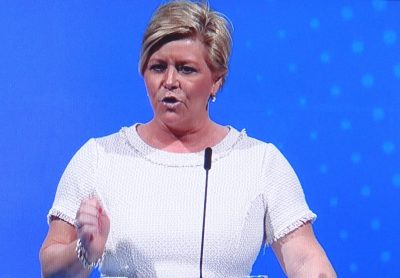An optimistic Norwegian government presented a revised state budget on Thursday that proposes few changes in the annual budget for 2017 that was approved in December. That’s because the economic program laid out in the budget is working well, according to Finance Minister Siv Jensen.

“Unemployment is on its way down and economic growth is on its way up,” Jensen said on Thursday, when she presented the revised budget in Parliament. “That shows that the government’s policies are working and addressing the challenges the Norwegian economy faces in both the short and long term.”
Jensen went on to claim that through her new if few budget proposals, the government was providing the right basis “for necessary economic restructuring (towards a more “green,” non-oil dependent economy), for new jobs and further growth.”
Her remarks echoed those made earlier in the week to newspaper Dagens Næringsliv (DN), when Jensen claimed that “optimism is back, we’re moving towards brighter days and consumers are also more optimistic. This applies to Southern- and Western Norway as well,” areas hit especially hard by the fall in oil prices that all but halted new investment and forced major cost-cutting in Norway’s oil and offshore industries.
Cutting back on use of oil revenues
Her remarks were based on a string of recent reports from analysts and economists at local banks and brokerage firms and, not least, a recent survey of 600 companies in Southern- and Western Norway that reported a dramatic change in the mood after three years of downturn.
Jensen noted that the turnaround is based on low interest rates and expansive financial policies. A weak Norwegian krone has also contributed towards considerable improvement in the competitiveness of Norwegian exporters, with sales booming especially at seafood producers and within the tourism industry. Jensen also pumped more actual oil revenues into the economy than ever before, even though her overall use of Norway’s Oil Fund (where the state’s oil revenues are saved for future generations) remained well within the guidelines deemed prudent. Not only has the Oil Fund grown enormously, less than half its earnings have been spent since it was set up in the late 1990s.
Now Jensen is confident enough in the Norwegian economy to cut back on her use of oil revenues. She’ll be tapping the fund for NOK 4.7 billion less this year than initially budgeted. At the same time the government in which she plays a key role will cut taxes and fees by NOK 2.1 billion, especially for retirees (NOK 840 million) who’ll save an average of NOK 1,000 each.

Jensen still found money in the budget to build another 1,300 new nursing home room for NOK 108 million and provide an extra NOK 100 million to the police to fund equipment and uniforms needed for extra patrols. The government will also provide NOK 48 million for avalanche prevention and housing needs on Svalbard and NOK 57 million in measures to counter long-term unemployment.
Some of that money was provided by a decline of NOK 400 million in costs for asylum centers and integration programs, because of the sharp decline in asylum seekers arriving in Norway. Economic growth has also provided an increase in tax revenue to the state.
The state budget and its mid-year revision are often used to further the government’s political programs, but commentators claimed there were few signs of that in Jensen’s revised budget on Thursday. Some exceptions were new funding allocations for projects in Bergen, Prime Minister Erna Solberg’s home town, including NOK 40 million for rehabilitation of Bergen’s main theater, Den National Scene, and NOK 25 million for rehabilitation of the business school Norges Handelshøyskole in Bergen.
“We’re mostly using money on things that are good for Norway and folks’ everyday life, like health and elder care, education, security and transportation,” Jensen claimed. “Even though the graphs are pointing in the right direction, the government’s most important job is still getting more people back to work.”
Fighting back against the Labour Party
Her revised budget and comments come at a time when the opposition Labour Party, which no longer can complain about rising unemployment, still complains that not a big enough portion of the population is in full-time jobs. Labour also continues to bash the conservative government’s tax relief programs and thinks it’s necessary to raise taxes instead.
“I’m tired of the Labour Party’s descriptions of misery in Norway,” Jensen told DN before presenting her budget on Thursday. “They lost their best campaign issue, rising employment, months ago. The government handled that problem.” She also defends the oil money her ministry pumped into the budget in 2015 and 2016, which Labour also has criticized.
“It was absolutely correct and necessary to use more of our oil revenues to meet the challenges,” Jensen told DN. “We’re building more schools and nursing homes, which are needed and create jobs. And I’d like to remind everyone that an entire professional financial milieu has said that it was correct to step on the gas in the situation we were in. The question has been whether the government would be able to step on the brakes when the situation turned. We saw the first sign of that when we put forth the budget for this year.”
The latest came in her revisions this week. They may not jibe with Jensen’s Progress Party’s own political platform, however, which calls for a lot more tax cuts on everything from property to alcoholic beverages and cars, to the tune of NOK 50 billion. That may not give much room for more spending, but Jensen notes that there will still be strong earnings on the oil fund to tap into. Some of her party’s tax cuts may also win a nod from others, including one that would allow homeowners to deduct some of the costs of remodeling their homes. Not only could that further stimulate the carpentry, painting and plumbing branches but it would help fight the black market that flourishes in the building trades. Without receipts showing that VAT has been paid, there can be no tax deductions.
newsinenglish.no/Nina Berglund

